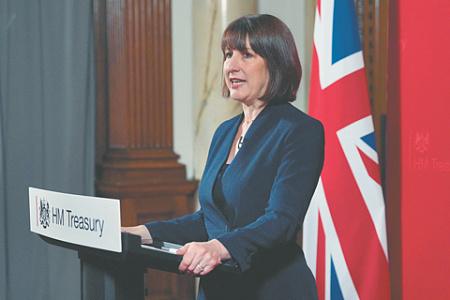
The Labor government is borrowing significantly more than expected, while the budget deficit is growing. This forces the British authorities to take budgetary austerity measures. The holy of holies for former Labor governments may also go under the knife: the social sphere. There are two main ways for Downing Street to save money: either to reduce the salaries of civil servants, including teachers and doctors, which is practically unacceptable, or to reduce social benefits. The authorities have not yet considered an alternative option regarding reducing investments in the military-industrial complex.
According to the National Statistical Office, published on Wednesday, April 23, the budget deficit in March amounted to 14.6 billion pounds against the projected 14.1 billion. Last fiscal year, when the Conservative Party government was in power, the budget deficit amounted to 151.9 billion pounds. Then, compared to 2023, it increased by 20.7 billion. The Labour cabinet of Prime Minister Keir Starmer has promised that it will end the growing budget deficit. Now he will have to admit his own inability to do this. The International Monetary Fund (IMF) lowered its forecast for the growth of the British economy from 1.6% to 1.1%. This is partly due to the tariff war of US President Donald Trump. However, it is unlikely that Starmer and British Finance Minister Rachel Reeves will be able to shift responsibility for the country’s economic failures to the White House.
Reeves has already had to save money. Her role in the government is considered one of the most difficult. In a period of stagnation, she needs to level the budget and prevent excessive spending growth, despite the fact that the Labor Party preaches more left-wing views than their Tory predecessors.
So far, the Finance Minister is not coping with any of the tasks. Moreover, a number of supporters of the welfare state are outraged that many guarantees to the population are under threat. In March, even the leader of the Conservative Party, Kemi Badenoch, spoke from the same positions in the House of Commons (see NG on 03/26/25).
Analysts point out that the budget is already more than tightly staffed. There is practically nothing to save on. There are two options – to reduce social benefits or to cut salaries for state employees. In the country, teachers and junior medical staff constantly protested over low salaries until a compromise was reached with the government. Otherwise, London would have lost more money due to the strikes.
Another way to replenish the budget – in the form of tax increases – has not yet been declared either, despite the fact that the Labor Party (that is, the left), and not the Tories, are in power. There are well-founded fears that the tax increase will not lead to a replenishment of the treasury, but to the opposite effect due to the flight of tax residents. Nevertheless, economists are increasingly coming to the conclusion that tax increases will be undertaken.
Starmer’s cabinet could significantly improve the situation by refusing to increase military spending. However, the Russian threat has so captivated the minds of the British elite that they are not going to back away from the idea of raising spending to 3% of GDP, considering the Kremlin as an existential threat.
The Office for Budget Responsibility had expected the budget deficit to be 137.3 billion, not 151.9 billion pounds. The less pessimistic, but also not encouraging forecasts of private analysts did not materialize. The fact that the British economy and government are performing worse than investors expect them to can lead to very unpleasant consequences. With declining confidence in the British economy, it will become more difficult for the government to borrow new funds, and at less favorable interest rates. As a result, the UK may enter a vicious circle similar to that of the unlucky Argentina. It is complicated by the fact that the British economy has few points of rapid growth that could generate large income for businesses and taxes for the state.
Starmer is trying to use artificial intelligence (AI) to improve the situation. However, the country is not yet a leader in this area, and with its relatively modest resources, which are not comparable to those of the United States and China, it is unlikely to become one.
